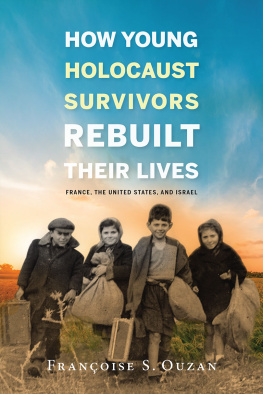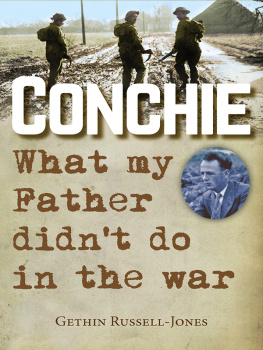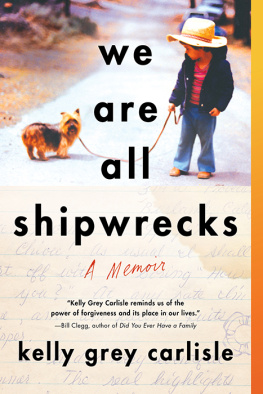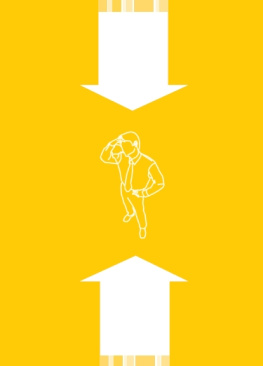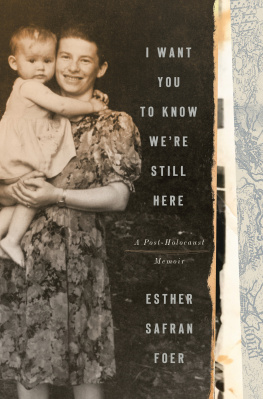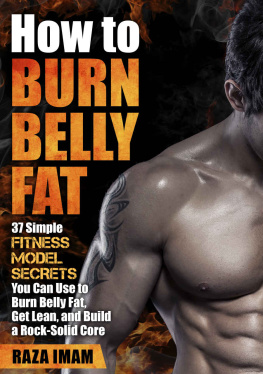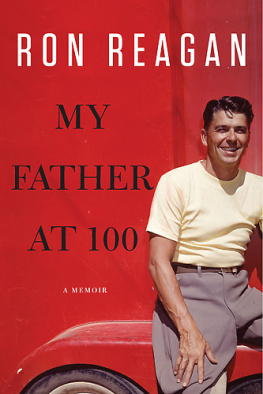PRAISE FOR WHAT THEY DIDNT BURN
I know of no other work that so eloquently succeeds in combining a dogged search for a Nazi paper trail of evidence and a sons reconciliation with his familys Holocaust legacy. What They Didnt Burn is not only an engaging piece of rigorous research, but also a harrowing and heartwarming personal saga of discovery as well.
SCOTT MILLER, author of Refuge Denied,
The St. Louis Passengers and the Holocaust
... A compelling blend of memoir and historical research, beautifully written. Laytners deeply personal story is an important addition to Holocaust literature, but will also resonate as a historical detective story. Along the way, he ponders how do we know what we know about history, and the lives of those who made it or were brutalized by it? Are documents better evidence than memory? How does one understand the ethical (and unethical) choices made by victims and victimizers alike?
KENNETH S. STERN, director, Bard Center for the Study
of Hate, author of The Conflict over The Conflict:
The Israel/Palestine Campus Debate
Mel Laytners What They Didnt Burn offers the reader both an emotional account of a son retracing his fathers traumatic experiences under Nazi persecution, and a gripping detective story of a savvy journalist uncovering what they didnt burn. This beautifully written and deeply felt book, a powerful tribute to his fathers fortitude, also serves as a reminder that the long shadow of the Nazi past stretches over generations.
GABRIELLE ROBINSON, author of Apis Berlin Diaries
Mel Laytners book is remarkable... He puts his readers into every scene, astonishing us with surprises that allowed many Jews to survive, escaping the hideous concentration camps: Blechhammer, Auschwitz, Buchenwald, and others... Never forget the Holocaust. You will never forget Laytners book as well.
JOELLE SANDER, author of Before Their Time: Four Generations
of Teenage Mothers, awarded Best Book for Adults About
Children by the Braun Center for Holocaust Studies

Copyright 2021 Mel Laytner
All rights reserved, including the right to reproduce this book or portions thereof in any form whatsoever.
Published by SparkPress, a BookSparks imprint,
A division of SparkPoint Studio, LLC
Phoenix, Arizona, USA, 85007
www.gosparkpress.com
Published 2021
Printed in the United States of America
Print ISBN: 978-1-68463-103-2
E-ISBN: 978-1-68463-104-9
Library of Congress Control Number: 2021908293
Interior design by Tabitha Lahr
All company and/or product names may be trade names, logos, trademarks, and/or registered trademarks and are the property of their respective owners.
Names and identifying characteristics have been changed to protect the privacy of certain individuals.
To my childrens children.
Never forget
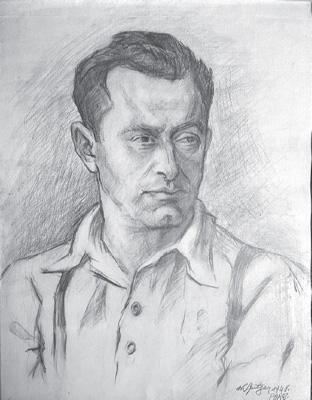
But why do I talk of Death?
That Phantom of grisly bone,
I hardly fear its terrible shape,
It seems so like my own
It seems so like my own,
Because of the fasts I keep;
Oh, God! that bread should be so dear
And flesh and blood so cheap!
THOMAS HOOD, The Song of the Shirt
[First published 16 December 1843.]
Contents
INTRODUCTION
T hey burned his younger sister and her two-year-old daughter. They burned his half-brothers and their families. They burned his uncles and their wives. They murdered the sisters husband. He probably wasnt burned but dumped into a shallow mass grave in the hills above a small village in western Poland.
When they couldnt burn any more people, they set about burning the records and documents to hide their sins. What they didnt burn was a paper trail that tracked the mans journey through ghettoes, slave labor, concentration camps, death marches, and more. They didnt burn the hidden records that revealed surprising and painful incidents he had never talked aboutat least not to me, his son.
Its not that my father, Josef Dolek Lajtner, never told me stories about the war; he did, many of them. As a child, wed snuggle together on the green living room armchair with the tasselsDaddys chairas he spoke of survival and escape from Hitler-and-the-Nazis, a phrase always uttered as a single malignant noun. The war was less than ten years past, my fathers recollections fresh and detailed. His stories ended with the same moral: So you see son, in the end it didnt matter if you had money or not, were smart or dumb. Life was worth nothingabsolutely nothing. You needed luck.
Because of this reservoir of stories, I knew with the certainty of youth that I knew everything worth knowing about Hitler-and-the-Nazisthe camps, the struggle to survive, that life or death was a coin toss. I never felt a need or curiosity to explore beyond some popular war movies of the period. I never read memoirs by Elie Wiesel and Primo Levi or even The Diary of Anne Frank until well into my adult years, and only then because my daughters were assigned them for school and I felt obliged to know what they were talking about.
Only decades later, only after uncovering the documents they didnt burn, did I realize I had learned more about the Holocaust from Hollywood than from all of my fathers stories.
After Dads death, and especially after my mothers passing seven years later, I felt their stories fading like family snapshots in a shoebox. Our children may know who they are, intellectually. However, they will never speak Yiddish, the lingua franca of my parents generation. They will never have a Grandpa Joe or a Grandma Helen as links to a world long gone. Something very important was being lost.
When my young daughters and nieces asked about the grandfather they had never met, I would recount Grandpa Joe stories that came to mind in the moment. I had been a reporter for some twenty years and prided myself on knowing how to spin a story. The children listened politely, asked a question or two, and reliably proclaimed the story amazing. Yet doubts nagged: Did the story really stick? Would it be remembered, if at all, more as family fable than family fact? Though but one generation removed, was I one generation too far to recapture the poignant humanity, the essential truth of my fathers calm, measured voice?
As a former journalist, I knew that relying on my memories of my fathers remembered stories could never pass any sniff test of Reporting 101. Where was the corroboration, the proof, the facts?
The truth was, I had no facts, only memories of facts. I could tell my daughters no more because I knew no more. I had been repeating my fathers vague vignettes in a vacuum.
Like my father, every Holocaust survivor has an amazing story. If they didnt, they wouldnt have survived. Yet if the stories sound too amazing, they risk being dismissed as exaggerations, or worse. How will their stories be remembered by future generations further and further removed from the war?
As I exhumed the documents they didnt burn from archives in Poland, Germany, France, Israel, and Washington, a gradual realization imposed a somber discipline I had not anticipated.
From the most unlikely of sourcesthe Nazis themselvesthe documents corroborate not only a mans chronology but also the chronologies of his camp comrades, those who survived and those who did not.
These yellowing papers demanded respect. For mixing the warm memories of my fathers stories with cold facts from these documents risked yielding a tepid brew that satisfied neither the soul nor the intellect. Still, I would have to resist the urge to dramatize the undramatic, insinuate significance into the insignificant, draw sharp conclusions from vague evidence, or, conversely, ignore hard evidence in favor of facts I might reasonably presume to improve the narrative.
Next page


